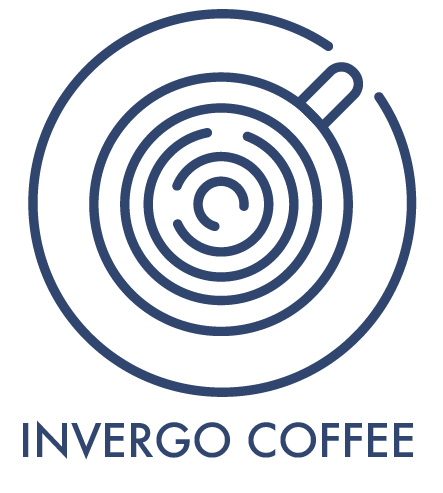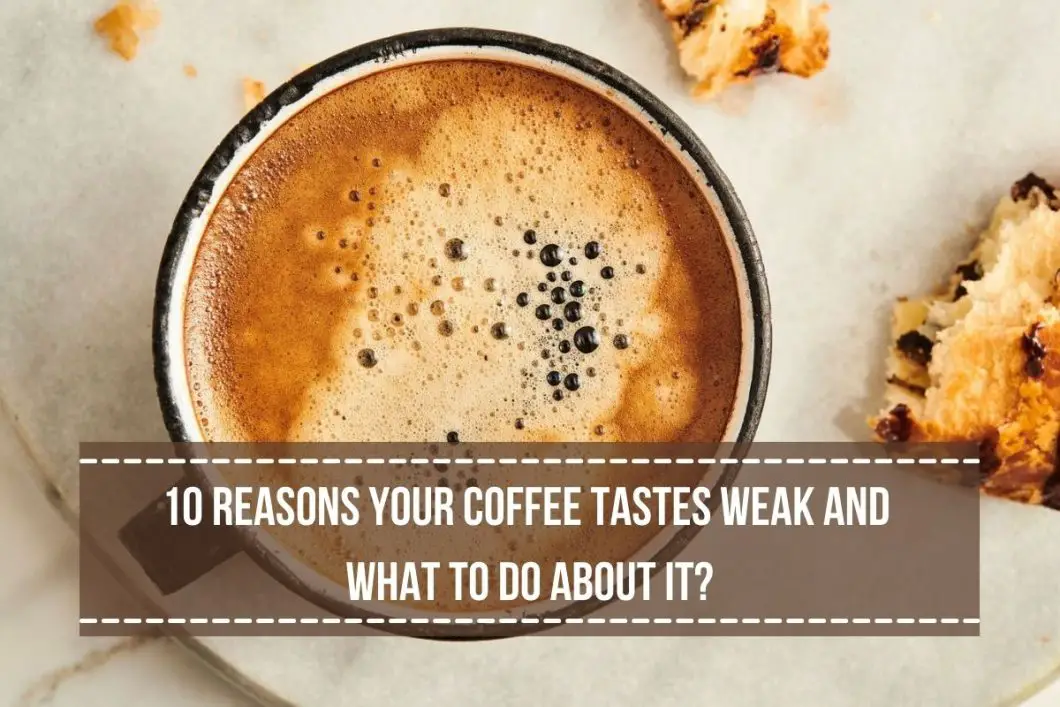Have you ever brewed yourself a big steaming mug of java and sat back ready to enjoy this delicious elixir only to discover that it resembles dirty dishwater? If you’ve ever been disappointed with just how weak coffee can taste then this is the article for you.
There are loads of reasons why your coffee doesn’t taste as rich and bold as it should and once you get to grips with these, you’ll never suffer a weak tasting cup of joe ever again.
Here are ten reasons why your morning cup of joe isn’t as rich and satisfying as it should be and what you can do to avoid falling into these coffee-making traps.
Contents
- 1 1. The Ratio is out of Balance
- 2 2. Your Grind Size is Off
- 3 3. It’s Not Brewing for Long Enough
- 4 4. Check the Age of Your Coffee
- 5 5. Try Using Whole Beans
- 6 6. Use a Burr Grinder
- 7 7. You Need to Filter the Water
- 8 8. Check the Temperature
- 9 9. Try Using a Darker Roast
- 10 10. Consider a Different Brew Method
- 11 Final Thoughts
1. The Ratio is out of Balance
The very first thing you need to check when your coffee is tasting weaker than it should is that you’re using a good ratio of coffee to water. Most brew methods need a 1:15 ratio of coffee to water to really get those taste buds tingling. This means that for every 15ml of water you need 1g of coffee.
This ratio works well for French press, pour-over, Aeropress, and drip coffee but not for espresso making. You need a 1:2 ratio for this kind of coffee.
This coffee brewing ratio is not set in stone and you can adjust it to suit your taste preferences. If you still find your coffee is too weak at a 1:15 ratio you can try a 1:14, 1:13, and so on.
2. Your Grind Size is Off
Another key reason why your coffee isn’t tasting as it should is that your grind size isn’t ideal for the brew method you have chosen. If the grind is too coarse then the surface area of coffee in contact with the water is less than ideal. This means a lot of the delicious flavors stay locked up in the coffee grounds and don’t make it into the water.
Only use coarsely ground coffee for French press and cold brew coffee. For drip coffee and pour-over, you want a medium grind. Aeropress and Moka pot need a medium-fine grind and espresso needs a fine grind. Turkish coffee goes one step further as it needs an ultra-fine grind setting that’s almost powdery.
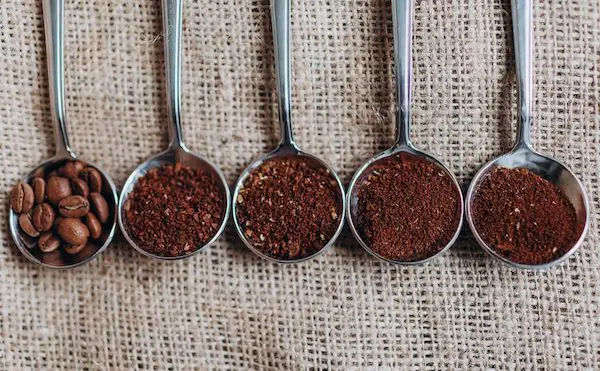
3. It’s Not Brewing for Long Enough
Are you leaving those beans to stew for enough time? If the coffee doesn’t sit in the water for enough time then the extraction process is not long enough to get a good flavor profile into your cup of java.
For immersion brewing like a French press, you need to leave the coffee to brew for 4 minutes before you press the plunger.
Pour-over coffee should brew in 2.5-4 minutes depending on the roast used. Aeropress takes 1:45-2 minutes to brew and espresso is 30 seconds.
4. Check the Age of Your Coffee
A lesser-known reason for coffee to not taste as strong as it should is that the beans are not fresh. Freshly roasted coffee beans are bursting with flavor and aroma but this fresh taste gradually declines as time passes. Even when stored correctly, by around the 2-month mark, the coffee will have a notable decrease in flavors. By 6 months it will taste pretty dull and will be weaker when you brew it.
Avoid this issue by using the freshest beans you can find and make sure you store them in an airtight container as this prolongs their lifespan.
5. Try Using Whole Beans
Similar to the point above, pre-ground coffee often tastes weaker than whole beans due to the aging process. As soon as coffee is ground up it starts to lose a lot of its rich flavors that whole coffee beans manage to lock in.
If you want the fullest flavor in every cup of java you brew then try using whole coffee beans and just grind up the amount you need every time.
And I’m sure I don’t need to say it, but don’t reuse your coffee grounds.
6. Use a Burr Grinder
To ensure an even flavor extraction and gain the freshest flavors in every cup of joe then you need to use coffee that’s ground to an even consistency. This allows a balanced flavor extraction and removes any risk of brewing a weak, bitter, thin, and just unpleasant cup of coffee.
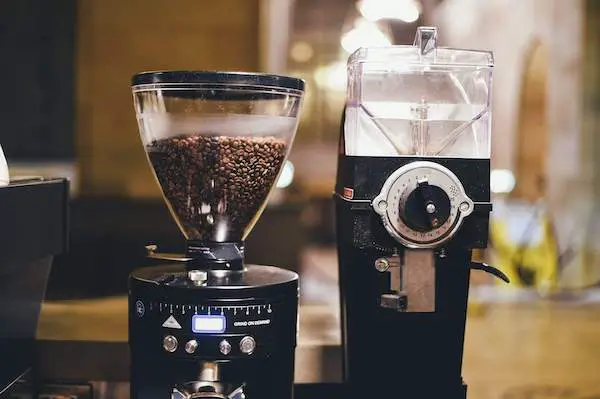
The only way you can ensure you get an even grind consistency is to use a burr grinder. These machines let you set the grind by adjusting the distance between the burrs.
The other option is a much cheaper blade grinder and these work a bit like a food processor with a fast-rotating blade. The blades roughly chop the beans into uneven sizes and can even heat up and burn the beans before you even start brewing your coffee. To ensure the fullest flavors in your cup of joe, use a good quality burr grinder.
7. You Need to Filter the Water
Tap water often contains hard minerals that impart a bitter taste to your freshly brewed cup of java. Alongside this, the hard water actually interferes with the extraction process so leads to a weaker tasting cup of coffee.
If you live in an area with hard water then pass it through a water filter jug or tap before you brew coffee with it. You’ll end up with a stronger-tasting, more delicious cup of coffee and this helps avoid limescale build-up in your coffee maker.
8. Check the Temperature
Another reason why your coffee is not as strong as an ox can be due to the water temperature. Coffee has an optimal brew temperature range that brings out the fullest flavors from your coffee beans. This temperature range is 195-205F (90-96C). If the water is too cold then this causes that weak flavor.
You don’t want to push it too far the other way either as water that’s too hot will lead to a burnt, bitter-tasting brew.
You can check the water temperature with a kitchen thermometer or by using a kettle with a built-in thermometer. If you don’t have either of these to hand then allow the kettle to boil and let it sit for a minute as it will cool to around this temperature.
9. Try Using a Darker Roast
The roast of coffee you use can affect the taste of your coffee pretty significantly. Lighter roasts have a more acidic brightness and complex mix of flavors but produce a coffee that’s lighter to drink. If you feel this is too weak to taste then switching to a darker roast can really step up the flavor intensity.
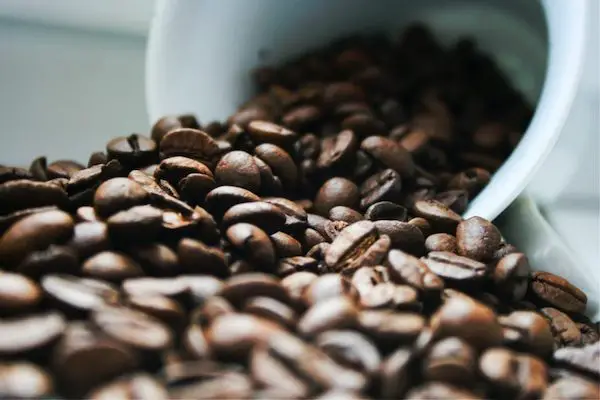
Dark roast beans are rich in single-note flavors like chocolate, burnt caramel, nutty, and woody hints. They are more oily so give a coffee with a thicker mouthfeel. If you’re trying to intensify your coffee experience then consider a dark roast coffee bean.
Related post: French Roast Vs Italian Roast: The Difference Between
10. Consider a Different Brew Method
If you’ve tried it all and your java still doesn’t have enough kick to it then it may just be the brew method you are using. If you like drip coffee but it’s often too weak then consider switching to pour-over as this gives you more control over the brewing of your coffee.
If this doesn’t cut it, try using a french press or Moka pot. Another option is espresso which is a very intense form of coffee that may suit you better. Turkish coffee is another extremely strong way to brew java that will guarantee to knock your socks off.
Final Thoughts
There are loads of reasons why your coffee isn’t as strong as it should be. Thankfully, these reasons are pretty easy to diagnose once you understand your coffee brewing a bit better. I hope this article has been helpful in troubleshooting your weak-tasting java and I wish you a strong and bold cup of joe with every brew.
